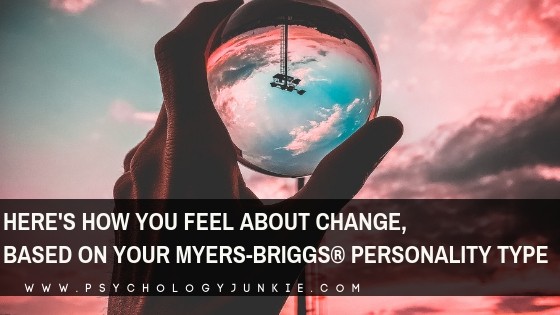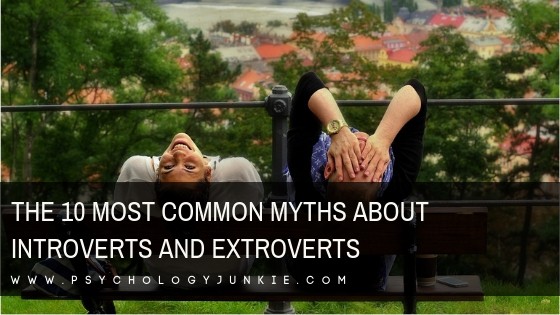What Each Extroverted Myers-Briggs® Personality Type Is Skeptical Of
Last week I wrote an article describing how each of the introverted Myers-Briggs® personality types is skeptical about specific ideas, beliefs, or decisions. Today we’re going to dive into the extroverted personality types and find out what they are suspicious of! Let’s get started
Of course, if you’re not sure what your personality type is, you can always take our personality questionnaire here. Or you can take the official MBTI® here.

What Each Extroverted Myers-Briggs Personality Type Is Skeptical Of
Estimated reading time: 11 minutes
The ENTP
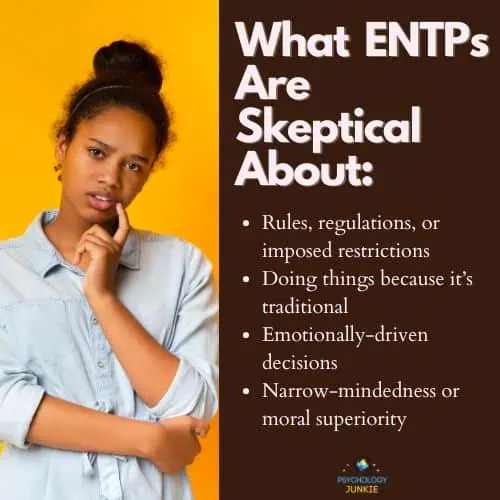
I call ENTPs the Trailblazers, and that’s because they’re always on the hunt for new and original ideas that can change the course of history. Rather than sticking with what’s always been done, they like to evolve, change, and transform. Because of this, they tend to be skeptical about rules and procedures that rely on tradition or impose a sense of predictability and conformity where there could be room for innovation. Trailblazers haven’t gotten a reputation as rule-breakers for nothing!
As Thinking-Perceiving types, ENTPs focus on radical honesty. They question everything, parsing out any biases or emotions that could get in the way of 100% accuracy. Sometimes this can lead them to controversial beliefs or theories. But they’d rather be accurate than popular, and that’s why ENTPs are often at the forefront of any battle over free speech. They believe that freedom of thought, discourse, and argument is crucial for the preservation of truth.
Thanks to their innovative, truth-seeking nature, ENTPs tend to be skeptical of:
- Rules or regulations that seem to stifle creativity and out-of-the-box thinking
- Decisions made without considering all possible options
- Systems or ideologies that prioritize maintaining traditions over adapting to new information or circumstances
- Emotional arguments that lack logical backing
- Faith-based ideologies that lack logical consistency (this isn’t to say ENTPs can’t have faith, but they tend to be highly skeptical before adopting a faith)
Find out more about ENTPs: 24 Signs That You’re an ENTP, the Trailblazer Personality Type
The ENFP
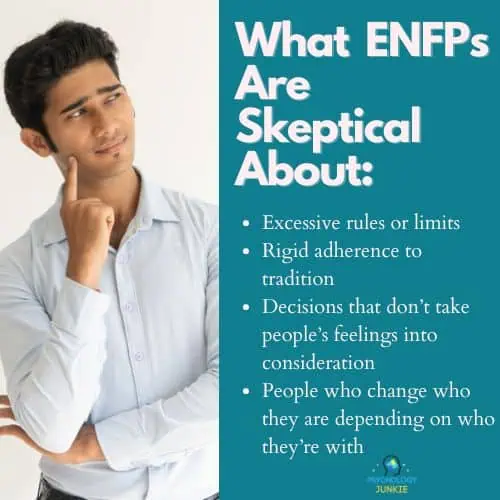
ENFPs, who I call The Visionaries, are filled with enthusiasm for life and a deep desire to understand and motivate those around them. Famous for their boundless energy and vivid imagination, ENFPs are drawn towards possibilities and what ‘could be’. While they may not like arguing over minor discrepancies in logic or data, they are skeptical about anything that seems inauthentic, controlling, or lacking in compassion.
As Intuitive-Perceivers, ENFPs are all about innovating, changing, and exploring creative possibilities. The antithesis to this is doing things the way they’ve always been done, sticking to tradition, and following a pre-ordained set of rules. Because of this difference, ENFPs tend to be skeptical of anything that seems overly-traditional, “nitpicky”, or focused on doing things the way they’ve always been done. Rules, procedures, and strict guidelines naturally raise an ENFPs skepticism. This doesn’t mean they can’t follow rules or respect traditions, in fact I know many ENFPs who have plenty of personal traditions they love. But their first response to any kind of rule or tradition being imposed on them is skepticism and a bit of distrust.
Because of the way an ENFP’s mind works, they’re naturally skeptical of:
- Doing things the way they’ve always been done
- Rules, guidelines, and strict procedures that might limit individual freedoms
- Decisions that don’t take into account the emotional implications on others
- Hierarchies and authority figures
- People who are social chameleons and change their tune depending on who theyh are with
- People who seem charming, but who seem to lack inner conviction
Curious about this personality type? Read The Courage of the ENFP Personality Type
The ENTJ
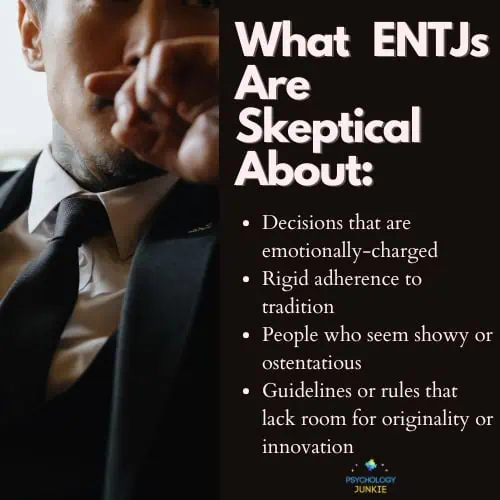
ENTJs, whom I refer to as The Directors, are the epitome of ambition and efficiency. They are continually looking ahead, strategizing the best path forward with a blend of visionary leadership and uncompromising willpower. ENTJs are naturally drawn to challenges and are undeterred by obstacles, often seeing them as opportunities to innovate and improve.
As Thinking-Judging types, ENTJs tend to sweep their emotions under the rug because they might get in the way of objectivity. Because of this, they tend to be skeptical of people who are highly trusting of their emotions or put a lot of weight into feelings-based decisions. To them, all feelings must be swept away so that a situation can be seen as clearly and logically as possible. And as Intuitives, ENTJs like to see things in new ways and try innovative, original approaches. They tend to raise their eyebrows when people impose a lot of rules based on tradition, policy, or guidelines that lack room for creativity.
Their skepticism often targets:
- Decisions that are deeply impacted by emotions
- People who are very showy and effusive with their feelings
- Policies, rules, and agendas that rely on keeping up with past precedent
- Doing things the way they’ve always been done
- Faith-based ideologies or religions that rely on making leaps in logical judgment
- Extreme political partisanship that may hinder seeing things objectively
Discover more about ENTJs: 10 Signs of an Unhealthy ENTJ
The ENFJ
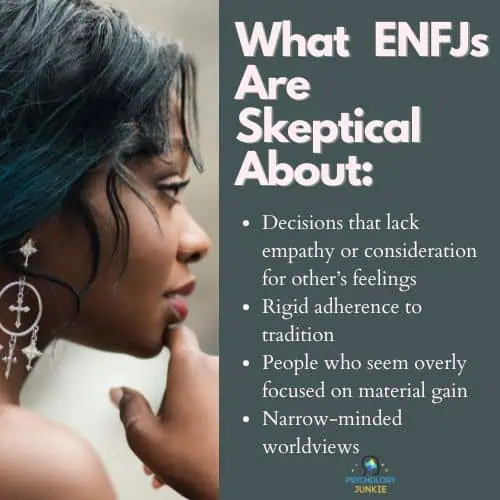
ENFJs, who I like to call The Mentors, believe in catalyzing people to reach their highest calling. Spiritual and empathic, ENFJs are the ones counseling, guiding, and driving others to be their best selves. As Intuitives, ENFJs are driven to understand the mysteries of the universe, the dance of life, the symbols that convey profound mystical meaning. Many ENFJs become gurus in their community, sharing insights and wisdom with their friends that drives them towards more meaningful lives.
As Feeling-Judging types, ENFJs believe that everyone should be treated with a sense of dignity, respect, compassion, and warmth. They tend to be skeptical of rules, regulations, and guidelines that lack compassion for individual differences. And as Intuitives, ENFJs crave creativity, innovation, and changing things in new, revolutionary ways. Hence, they tend to be skeptical of traditions and bureaucratic rules that impose a past-precedent or tradition that lacks room for novelty and change.
Their questioning nature often targets:
- Decisions that lack room for emotional considerations
- People who seem especially focused on the bottom-line and material gains
- Limiting facts and details that lack room for spiritual or conceptual understanding
- Narrow-mindedness, trusting only what can be seen/tasted/felt through the senses
- Judgments that lack empathy for the perspectives of others
- People who believe that prioritizing kindness, empathy, or feelings makes someone’s perspective inherently flawed
Find out more about ENFJs: The Shadow of the ENFJ Personality Type
The ESTP
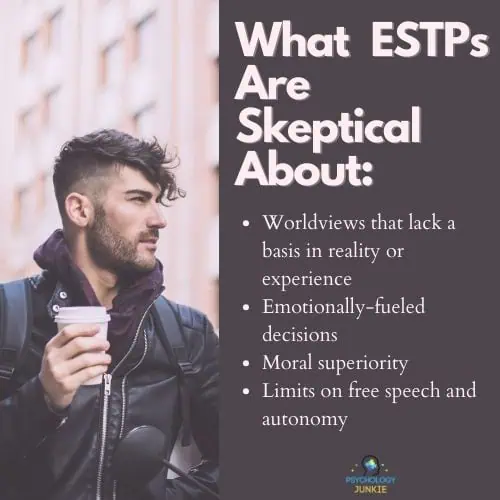
ESTPs, known as the Daredevils, are realists in every sense of the word. They trust what can be seen, touched, tasted, heard, and experienced with their five senses. Unlike some types who are more likely to get caught up in a whirlwind of concepts, ideas, and intangible longings, ESTPs have feet that are firmly planted on the ground. They stay present in the moment, noticing every detail, responding quickly to changes and crises.
Because ESTPs are naturally so realistic and observant, they tend to be skeptical of things that rely on a more mystical sense of understanding. And as Thinking-Perceivers, they are skeptical of emotion-based decisions. To them, everything should be questioned to see if it can hold up to logical scrutiny.
With all this in mind, ESTPs are naturally skeptical of:
- Mystical or spiritual belief systems (this isn’t to say they can’t have spiritual or mystical beliefs, but their initial response is likely to be questioning)
- Hunches that lack real experiential understanding
- People who bypass facts to make assumptions
- Emotion-based decision-making or judgment
- Rules, guideliens, or procedures that seem especially controlling
Curious about ESTPs? Find out more about them here: The Top 7 Gift Ideas for ESTPs
The ESFP
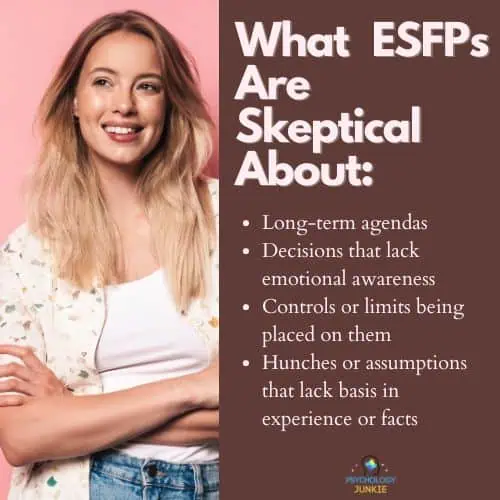
Nicknamed The Champions, ESFPs move through life with an infectious zest, always ready to experience the world in its fullest, brightest colors. For ESFPs, the world is a stage filled with opportunities for joy, creativity, and connection. They’re deeply in touch with the immediate, tangible world around them, and they have a powerful ability to bring out the best in others.
Given their love for being present in the moment, ESFPs are naturally skeptical of anything that seems to distance people from the here-and-now. They question things that lack a solid foundation in reality because, for them, life is most meaningful in the present, not by planning or conceptualizing everything about it. Decisions that overlook the human element or lack compassion also don’t sit well with them. They believe every choice should consider the impact on individuals’ lives, emphasizing kindness and empathy.
Because of this and some other personality traits, ESFPs are naturally skeptical of:
- Abstract theories that disconnect from practical, everyday experiences
- Traditions or rules that stifle individual expression and creativity
- Situations that overly prioritize logic over emotional understanding
- Any statement with a condescending, patronizing tone
- People who make quick assumptions about others
- The belief that life should be primarily focused on work, without much room for play or excitement
Discover more about ESFPs: 7 Ways That ESFPs Make an Impact
The ESTJ
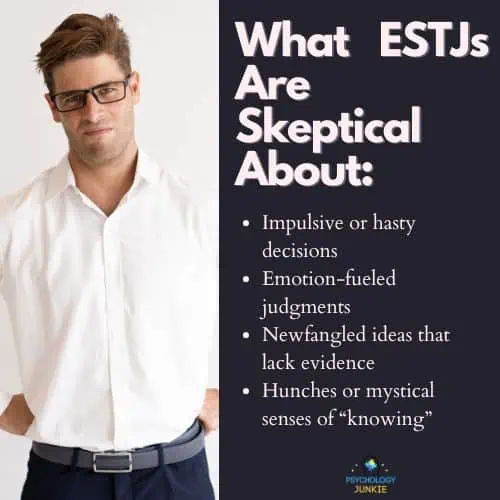
ESTJs are the kind of people you want around when everything is in a state of chaos and someone needs to “right the ship.” Grounded, organized, and responsible, they can make the tough decisions that other people shy away from. To the ESTJ, life must be lived in a principled, sensible way, with every decision being grounded in logic and practicality.
As Sensing-Judgers, ESTJs enjoy knowing life has predictable rhythms, ebbs and flows. They dislike chaos, unpredictability, and erratic behavior. Thus, they tend to be skeptical of people who are undependable, who seem flighty, or overly carried away with their feelings. Instead, they prefer people who show up when they say they will, say what they mean, and mean what they say.
Due to their natural personality preferences, ESTJs are naturally skeptical of:
- Philosophies or ideas that disregard practical application or tangible outcomes.
- Emotional reasoning that seems to override logical analysis and fact-based conclusions.
- Plans or projects that lack clear direction, structure, or deadlines.
- Individuals who frequently change their opinions or actions without logical explanation.
- Suggestions to significantly alter proven methods or traditions without compelling evidence of improvement.
- Leadership styles that prioritize feelings or intuition over efficiency and results.
Find out more about ESTJs: 24 Signs That You’re an ESTJ, the Captain Personality Type
The ESFJ
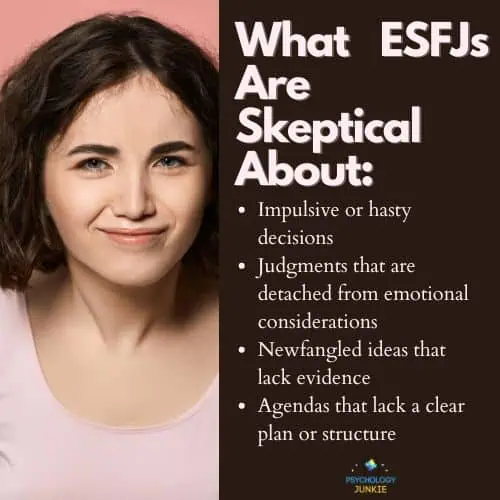
Down-to-earth and friendly, ESFJs know how to make most people feel at home in a matter of minutes. Nicknamed The Defenders, ESFJs believe in preserving traditions, creating stability, and promoting harmony and goodwill in their communities. Defenders prefer a life that is filled with friendship, home, and hearth. A life that is both stable but filled with joyful connections and companions.
As Sensing-Judging types, ESFJs crave a life that has a predictable sense of routine. Chaos is anathema to the Defender. They want to know from day-to-day what will happen, when it will happen, and how. They like details, perfecting details, organizing details, and admiring aesthetic details. As Feeling types, Defenders believe all decisions should consider the emotional impact on others. How will people feel? What values are at stake? These are the questions they ask themselves.
With that in mind, ESFJs are skeptical of the following things:
- Individuals who prioritize their own needs over the community or group welfare
- Decisions made hastily without weighing the potential emotional impact on those involved or the long-term consequences on relationships.
- Behaviors that disrupt harmony, such as unnecessary conflict, argument, or confrontation
- Trends or movements that challenge established traditions or norms without providing a clear, beneficial reason for the change.
- Radical changes to social structures or institutions that have historically proven to ensure stability and security for the majority.
Find out more about ESFJs: A Look at the ESFJ Leader
What Do You Think?
Do you have any insights, experiences, or thoughts to add? Let us and other readers know what you think by leaving a comment!
You can always discover more about your personality type in our eBooks, Discovering You: Unlocking the Power of Personality Type, The INFJ – Understanding the Mystic, The INTJ – Understanding the Strategist, and The INFP – Understanding the Dreamer. You can also connect with me via Facebook, Instagram, or Twitter!



